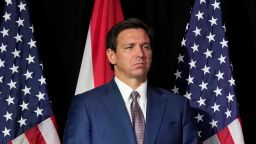“You Can’t Always Get What You Want” has long been the anthem to Donald Trump triumphantly walking off stage after his rallies.
But the ex-president’s entire political career, the modern Republican Party and a vast conservative media empire are based on the exact opposite premise of the Rolling Stones’ song: giving the party base exactly what it wants to hear – whether it is true or not.
Fox News is the latest example of opinion formers on the right exposed for being held hostage to the fury they helped to incite. Extraordinary revelations this week from a defamation lawsuit by Dominion Voting Systems showed that Fox Corporation Chairman Rupert Murdoch admitted under oath that some of the channel’s top stars endorsed false claims that the 2020 election was stolen as he tried to stop viewers from defecting. Previous disclosures showed some of those Fox hosts knew they were peddling lies but were worried they’d alienate their audience if they told the truth about Trump’s false claims.
The new details underscored how key players on the right feel they have no choice but to appease, satisfy and further inflame the voters and viewers on whom their profits or hopes of political power depend.
The GOP’s most fervent, constantly self-radicalizing voters have long led its leaders. GOP luminaries who resist the tide, like former Florida Gov. Jeb Bush, ex-Arizona Sen. Jeff Flake and former Wyoming Rep. Liz Cheney, see their careers expire. Those that buy in – like Florida Gov. Ron DeSantis or New York Rep. Elise Stefanik, now a member of the House GOP leadership team – can rocket to prominence.
But such a strategy can risk being turned into a Faustian bargain.
In Fox’s case, Murdoch’s testimony left the network in serious legal jeopardy and shredded its journalistic reputation.
Some media commentators would argue that Murdoch’s entire business model – using television stations in his native Australia and tabloid newspapers like The Sun in Britain, as well as Fox News in the US – has evolved from seizing upon and feeding political anger. And while he’s more known for backing conservatives, Murdoch has switched sides when business demands – for instance, when The Sun endorsed the British Labour Party’s Tony Blair over the fading Conservative Party in a 1997 general election.
There are also signs that the billionaire publisher may finally be getting buyer’s remorse over Trump given the headline in his New York Post after the ex-president’s low energy 2024 campaign launch in November, which read, “Been there, Don that.”
As he said in a deposition made public in a court filing on Monday in the Dominion case: “It is not red or blue, it is green,” referring to the color of a dollar.
Republicans know where their power comes from
The Republican politicians who appear on Fox are influenced by a similar calculation of what the political market will bear. Their unfiltered adoption of much of the doctrine favored by the conservative grassroots ultimately stretched American democracy to the limit.
Catering to that base helped fuel the rise of Trump in 2016, as he shattered the Republican establishment presidential field. GOP lawmakers whose hold on power depended on not crossing the reality-star-turned-president then allowed Trump to run riot. That helped foster an unstoppable radical tide that led to the US Capitol insurrection in 2021 and eventually to Republicans acquitting him in not one but two impeachment dramas.
There is every sign that the dominance of this Republican base still reigns supreme as a new GOP presidential campaign dawns. Trump is still the biggest name in the race, but his top potential rival is expected to be DeSantis, who bills himself as a hardline leader who can implement Trumpism better than its author but without the chaos that enveloped his presidency. In interviews with roughly two dozen members of the House’s “MAGA” wing, many told CNN’s Melanie Zanona and Manu Raju that they were not yet ready to commit to Trump – although there was excitement on the far right about DeSantis.
The huge power of the Republican base was the secret sauce that forced new House Speaker Kevin McCarthy to make concessions to the most radical representatives in the conference after 15 rounds of voting he needed to win his job. McCarthy had earlier watched as two predecessors, former Speakers John Boehner and Paul Ryan, tried to resist the GOP’s far right insurgency and lost their job. As McCarthy showed by handing Fox host Tucker Carlson access to hours of Capitol Hill security footage last week – despite Carlson’s conspiracy theories about January 6, 2021 – his speakership is a totally owned subsidiary of the GOP’s most extreme elements.
McCarthy’s dominance by the same GOP base that Murdoch worried about driving away is one reason why a coming showdown with the White House over raising the government’s borrowing limit has so many financial experts fretting about a possible default that could rattle the global economy.
There are also signs that the power of the Republican grassroots is leading the GOP down a dark and futile road. The party that defeated Soviet Communism now spends its time undermining US democracy. Trump’s lies about election fraud – amplified by Fox and other conservative networks – delight activists but scare off many moderate and suburban voters, who have contributed to the GOP’s loses in key swing states in recent general elections. Following Trump’s defeat in 2020, there’s a major question whether the no-compromise populism that the base demands can win national elections.
The straddle between winning a party’s base voters and trying to court middle America has long tested Democratic and Republican nominees when they have to pivot to a general election. In 2024, this political leap may require supreme political skill from whoever emerges from what could be the GOP’s “America First” primary.
What Trump and Murdoch understood and most Republicans didn’t
Trump’s astute political insight in 2016 was to see what no other Republican candidate did – that his winning coalition was angry and frustrated by years of foreign wars and globalized trade policies that many blamed for sending industrial jobs overseas. These voters were tired of conventional politicians and despised “elites” in business, politics and the media who they thought condescended to them. They also balked at political correctness and a wave of social and cultural change, permissive immigration policies and the diverse coalition that secured two terms for President Barack Obama. They wanted to send someone to Washington to break all the rules and to drain what Trump referred to as “the swamp.”
This was why Trump, an apparently unlikely clarion of the people after spending his life in Manhattan and flying around the country on a private Boeing with gold-plated fittings, was the perfect candidate for the moment. He was condemned by liberals for his extreme, racialized and sometimes profane rhetoric. But for his crowds, Trump’s early rallies were huge fun – more like stand-up comedy shows than conventional presidential events. Here was someone who was shouting out loud what millions of Americans had believed for years but felt constrained from saying because of social convention. Many commentators decried Trump’s demagoguery but fewer examined the social, economic and political reasons for his rise.
DeSantis in his new book explains the changes in the GOP base that led to Trump and that the Florida governor will seek to harness if he makes a run for president in 2024.
“This persistent theme — that Republicans in Washington fail to effectively represent the values of the people who elect them – foreshadowed the nomination of Donald Trump in 2016,” DeSantis writes in “The Courage to be Free,” published on Tuesday.
“The chasm between the aspirations of the GOP voter base and the behavior of party leaders in Washington would continue to grow wider in the ensuing years.”
DeSantis complains that politicians who go to Washington forget where they come from – and soon become instruments of a political system that works against their constituents’ interests. Yet issues like the need to raise the debt ceiling to keep the government solvent and the economy running or key foreign policy questions, like US support for Ukraine, sometimes require leaders to take a different view of the national interest than prevails back at home.
Many politicians face a moment when, for reasons of conscience or political reality, they risk alienating their closest supporters. But sometimes there is no choice but to spend this political capital.
The key to Trump’s appeal, however, is that he never did. The ex-president’s tearing at democratic norms after the election in 2020 was his version of telling voters what they, and he, wanted to hear. He allowed millions of Americans to believe that he had not lost to President Joe Biden and that the election was stained by widespread fraud – even though there was no basis for his claims. The Fox News opinion hosts who amplified his falsehoods were guilty of exactly the same transgression – not to protect political careers but apparently to save their lucrative livelihoods.
Trump had foreshadowed this marriage of convenience between his presidency and the conservative media infrastructure in an appearance at the annual Veterans of Foreign Wars convention in Kansas City in 2018.
“Stick with us. Don’t believe the crap you see from these people, the fake news. … What you’re seeing and what you’re reading is not what’s happening,” he said.
"politic" - Google News
March 01, 2023 at 07:28PM
https://ift.tt/NoQW6Y2
Fox learns the hard way about being beholden to the GOP base - CNN
"politic" - Google News
https://ift.tt/8lnLZoj
https://ift.tt/iy6D1A8




/cloudfront-us-east-1.images.arcpublishing.com/bostonglobe/VNG7YMZTRWJ5WBFTJ5NVETPCQI.jpg)
No comments:
Post a Comment